HESCO U210 Plates (sold individually)
$786.00 – $1,068.00
Advanced Spectra® design. Full AK-47 protection including 7.62 x 39 API. Multi shot rated on selected threats. Water repellant polyurethane coated CORDURA® fabric finish. Made in the U.S.A.
HESCO 200 SERIES PLATES ARE DESIGNED TO BE WORN WHERE CONCEALABILITY IS AN ASSET, FEATURING MODELS THAT OFFER BOTH LOW VISIBILITY AND SPECIAL THREAT PROTECTION.
Single and multi-curve designs in shooter, full and SAPI cuts are available depending on model.
- COST EFFECTIVE WITH NO COMPROMISE ON QUALITY
- ADVANCED COMPOSITE MATERIALS
- SINGLE AND MULTI-CURVE DESIGNS
- HIGHLY DURABLE, WATER RESISTANT POLYURETHANE COATED CORDURA® FABRIC FINISH
- PRECISION QUALITY CONTROL
BI U210 – SOLD INDIVIDUALLY
The closest thing to not wearing armor. Ultra-low visibility and ergonomic design
- 3.9 lb/1.8kg (0.56”/14mm)
- SPECIAL RIFLE THREAT
- STAND ALONE
- ULTIMATE IN CONCEALABLE SURVIVABILITY
SHOOTER CUT – MULTI CURVE – TORSO PLATES
| Part Number | Nominal Width x Length | Thickness | Weight |
| U210-SH-MC-L | 10.0 x 12.0 inches / 254 x 305 mm | 0.56 inches / 14 mm | 3.9 lb / 1.8 kg |
| U210-SH-MC-S | 8.0 x 10.0 inches / 203 x 254 mm | 0.56 inches / 14 mm | 2.6 lb / 1.2 kg |
SAPI CUT – MULTI CURVE – TORSO PLATES
| Part Number | Nominal Width x Length | Thickness | Weight |
| U210-SA-MC-XL | 11.00 X 14.00 inches / 279 x 356 mm | 0.56 inches / 14 mm | 5.4 lb / 2.5 kg |
| U210-SA-MC-L | 10.25 X 13.25 inches / 260 x 337 mm | 0.56 inches / 14 mm | 4.7 lb / 2.1 kg |
| U210-SA-MC-M | 9.50 x 12.50 inches / 241 x 318 mm | 0.56 inches / 14 mm | 4.1 lb / 1.9 kg |
| U210-SA-MC-S | 8.75 x 11.75 inches / 222 x 298 mm | 0.56 inches / 14 mm | 3.5 lb / 1.6 kg |
Manufacturing Tolerances:
- Thickness dimensions are ± 1/8 in (± 3 mm).
- Width and length dimensions are +0.00 to -0.25 in (+0.00 to -6 mm). All weights are ± 5%.
Is body armor legal for civilians?
We are not attorneys, or experts on the law (you should consult one if you have questions), but YES! Body armor is legal for almost anyone in the USA to own! Body Armor is regulated by Federal Law. No armor can be sold internationally.
At the time of writing, body armor is legal in all 50 states with the following three restrictions:
- Body Armor is illegal to possess if you have been convicted of a violent felony.
- Body armor may not be shipped to any civilians in Connecticut (CT). It is legal to purchase, possess and own body armor in CT, but it cannot be shipped.
- Wearing body armor while committing a crime can increase penalties greatly.
Check your local laws before ordering if you have any questions.
What NIJ or protection level is best for me?
In addition to possible department regulations, some factors to consider regarding NIJ Level include:
- Select armor designed to defeat ammunition used in your own firearm or in weapons known to be used in the area you patrol
- Know if your armor will be used as part of an Active Shooter Kit or worn for extended periods (consider how the weight of the plates might affect you)
- Know what firearms are used by your workforce (friendly fire?)
- Be aware of sport shooting or hunting in your area
If you are interested in reading more, you can visit the NIJ website and read more about the NIJ Body Armor Performance Standards.
It is also important to note that if you do not require NIJ certification, there are several "Special Threat" options that may provide some benefit for your intended use. For an overview of the various protection levels offered by HESCO plates, consult the "Threat Matrix".
HESCO Testing Protocol
Why use ceramic plates over steel plates?
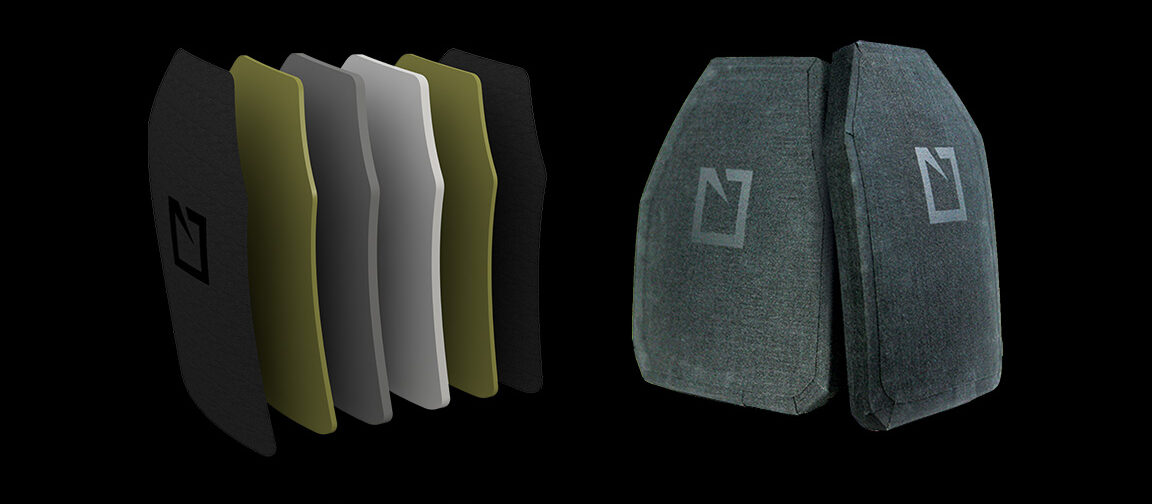 Ceramic (aka composite) body armor plates are lighter than steel plates, which can increase comfort and maneuverability, especially when wearing the armor for longer periods of time. Ceramic body armor technology advancements continue to offer better threat protection, which can meet and often exceed the threat protection offered by steel plates.
Ceramic (aka composite) body armor plates are lighter than steel plates, which can increase comfort and maneuverability, especially when wearing the armor for longer periods of time. Ceramic body armor technology advancements continue to offer better threat protection, which can meet and often exceed the threat protection offered by steel plates. What size plate should I get?
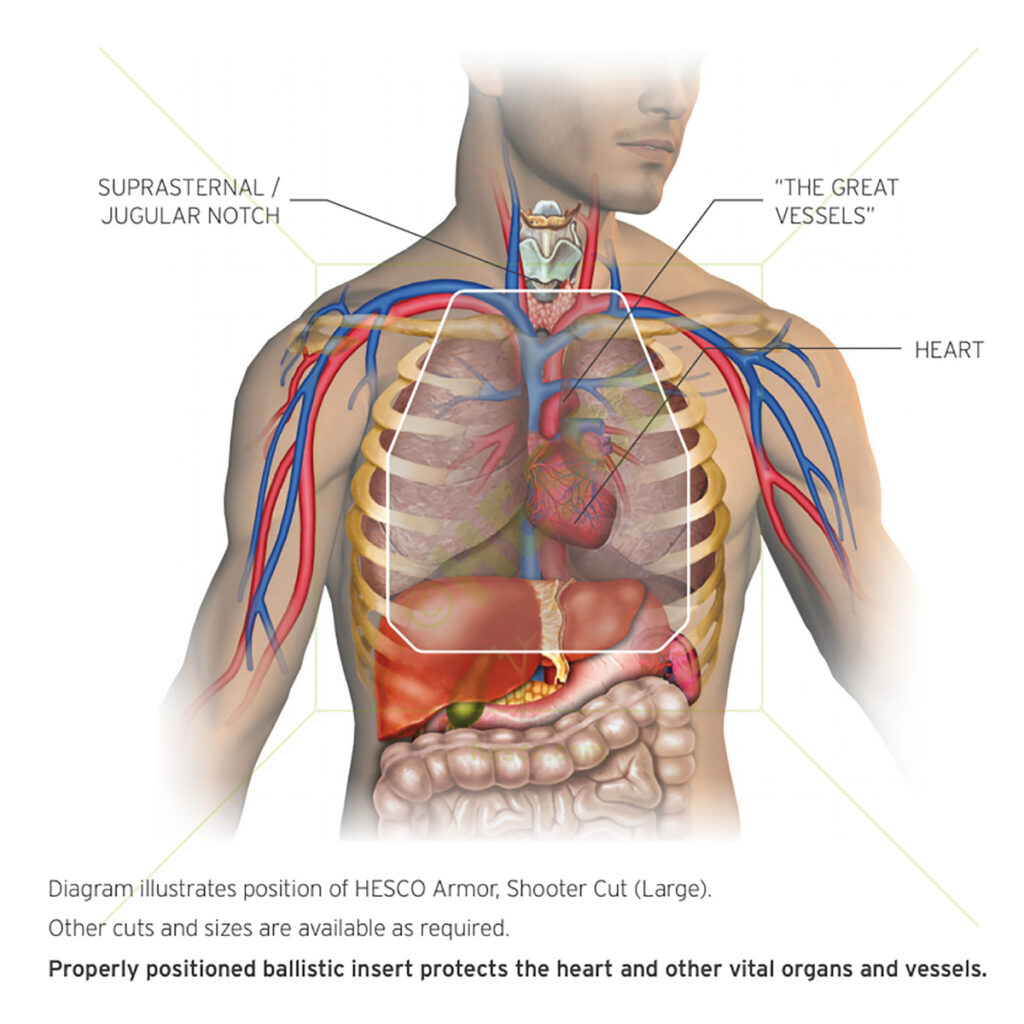 A properly fitted torso plate should not interfere with the comfortable movement of the arms and shoulders. If a plate is too large it may impede mobility and result in difficulty holding, aiming or discharging a weapon which can result in fatigue and inaccuracy.
A properly fitted torso plate should not interfere with the comfortable movement of the arms and shoulders. If a plate is too large it may impede mobility and result in difficulty holding, aiming or discharging a weapon which can result in fatigue and inaccuracy.
CHEST MEASUREMENT
Measure under arms around fullest part of the chest. Be sure to keep measuring tape level across back and comfortably loose.LENGTH OF PLATE
Determine the length of the plate that best suits your body type while protecting all vital organs and vessels. Plate should fit comfortably when standing or sitting.BE SURE PLATES FIT YOUR CARRIER
If you already have a vest or plate carrier, or if you will be purchasing one later, make sure it accommodates your new ballistic inserts.STEP 1 – determine your chest measurement and length of plate that best suits you
STEP 2 – select your plate style and appropriate size
| SAPI Cuts | XS | S | M | L | XL |
|---|---|---|---|---|---|
| Shooter Cuts | S | L | |||
| Chest | 32 - 35” (81.3 - 88.9 cm) |
36 - 39” (91.4 - 99.1 cm) |
40 - 43” (101.6 - 109.2 cm) |
44 - 47” (111.8 - 119.4 cm) |
48”+ (121.9 cm+) |
| Length of Plate | Determine the optimum plate length for you. When standing, the top plate edge should rest at the level of the suprasternal/jugular notch (see figure above). Bottom plate edge should extend to approximately 4.5 inches above service belt ensuring protection of vital organs and vessels. |
||||
How should my plates be positioned when worn?
MOBILITY AND COMFORT
Once the proper plate size has been determined, it is critical that plates be worn in the correct position on the body so as to allow maximum protection with minimal discomfort. When in a standing position, the top edge of the plate should rest at the level of the suprasternal / jugular notch (the soft spot right above the sternum). When your finger presses in that spot, the top edge of the plate should touch the bottom of your fingertip. Where the bottom plate edge rests depends on the wearer’s physical height. To insure protection of vital organs and vessels, the bottom edge of the front plate should extend to the bottom of the rib cage, or approximately 4.5 inches (114 mm) from the top of the service belt when standing. For comfort when seated, the space between the bottom plate edge and the service belt closes naturally preventing the insert from riding up into the neck area. A properly fitted torso plate should not interfere with the comfortable movement of the arms and shoulders. If a plate is too large it may impede mobility and result in difficulty holding, aiming or discharging a weapon which can result in fatigue and inaccuracy.POSITIONING THE BACK PLATE
When positioned properly in a plate carrier, the top and bottom edges of the back plate should align with the top and bottom edges of the front plate when viewed from the side. This coverage area provides maximum protection from the rear as well as user comfort while seated or standing. For additional back protection, some users prefer a full cut plate for the rear facing pocket which provides more upper left and right corner area coverage.What is the difference between single curve and multi curve body armor plates?
Which plate shape and curvature is right for me?
- Shooter Cuts with more severe shoulder angles offer an increased range of motion over the older, now discontinued "full cut".
- SAPI Cuts with slightly less severe angles are a military cut now available for law enforcement and other use.
- Some users prefer SAPI Cut (and maybe even up one size) with slightly more coverage for use as a backplate. Often a larger plate on the back will not interfere with presenting your weapons, or limit your mobility like it might if worn on the front (plus it can counterbalance all the extra gear weighing down the front of the plate carrier...)
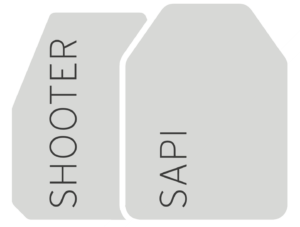
Why are the plates sold individually?
The body armor plates are priced and sold individually to allow maximum flexibility and configurability in purchasing options. Many users prefer different configurations, and selling the plates individually allows everyone to build their body armor system to their own specifications.
For example - some users may prefer a "shooters" cut for the front plate, but a SAPI cut for the rear. The rationale behind this option is that is allows slightly better coverage on the rear, with minimal impact to mobility and flexibility.



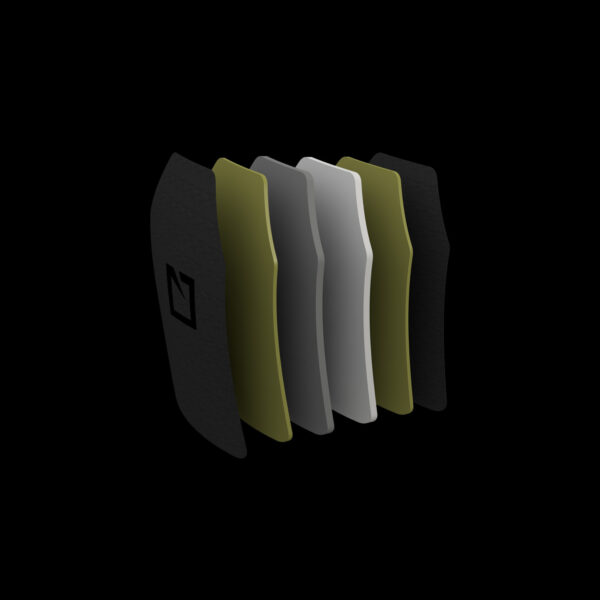

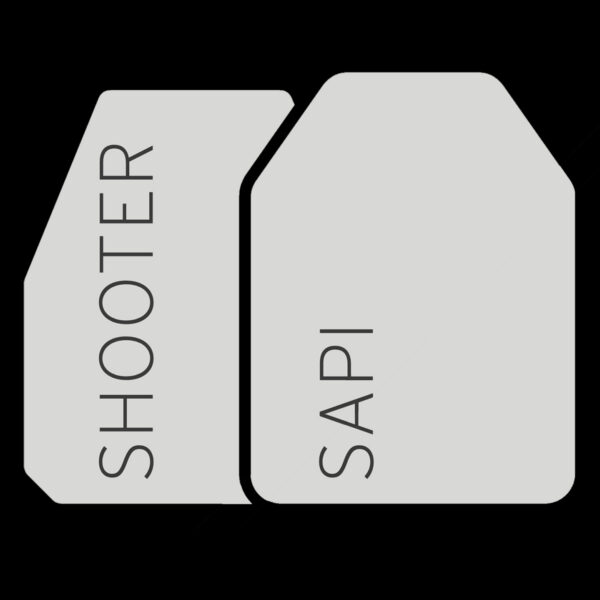

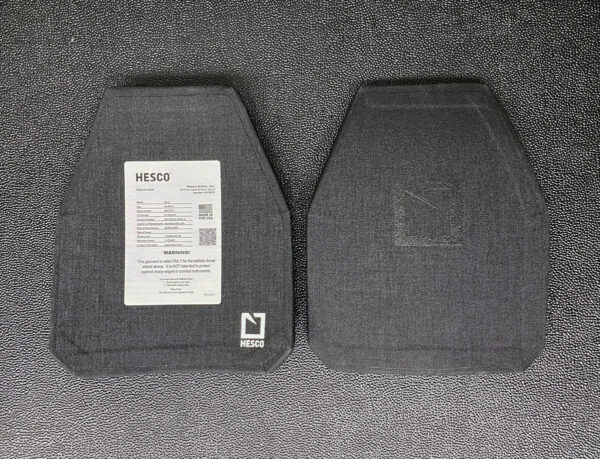

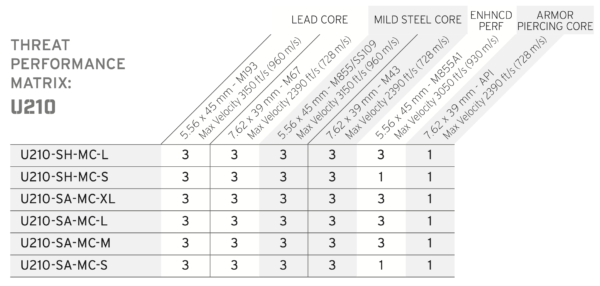

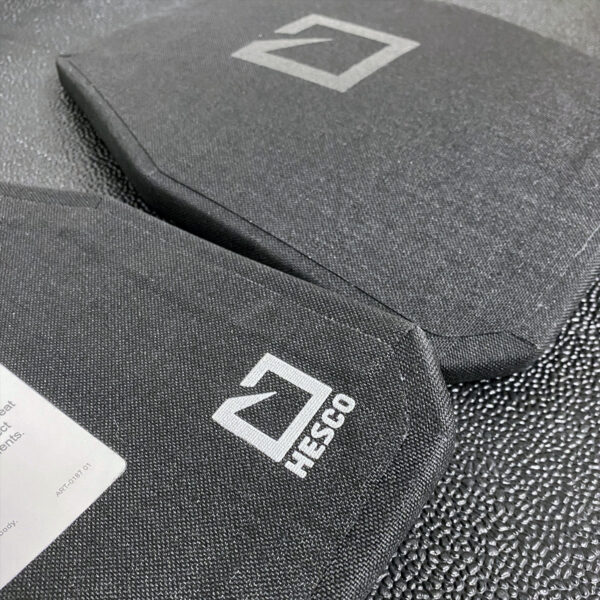

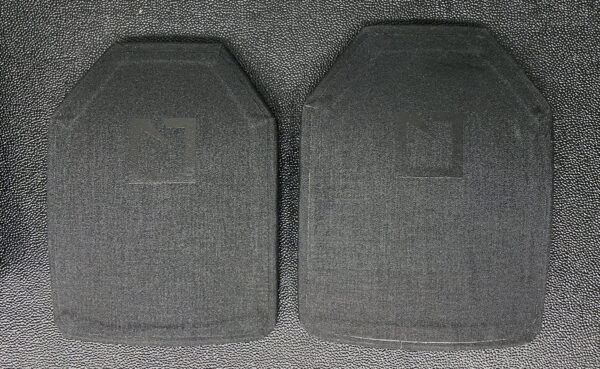










Reviews
There are no reviews yet.